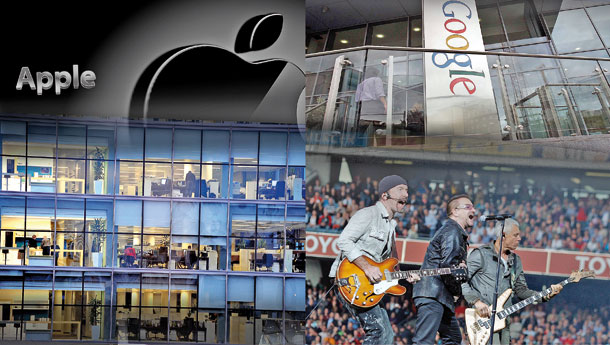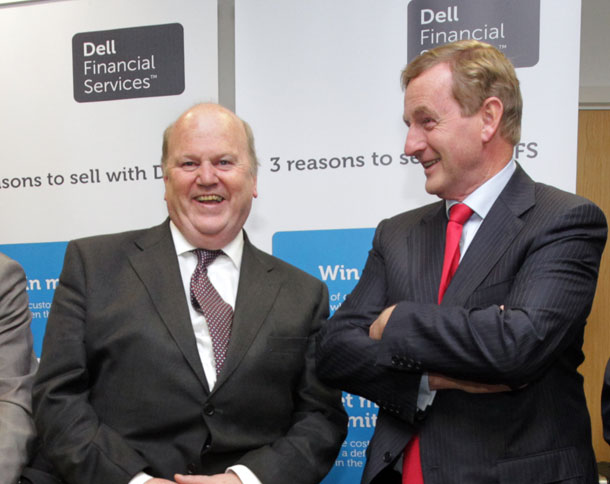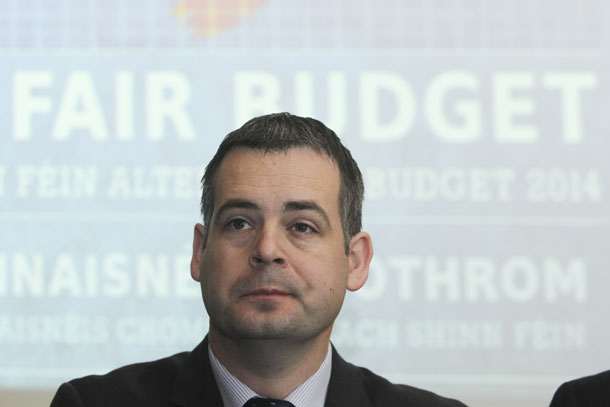1 December 2013 Edition
Dublin is the bag man for multinationals
The Irish Government’s complicity in global tax avoidance

We as citizens and our businesses are expected to pay our taxes yet multinationals are facilitated to avoid paying much more tax
AT THE Clinton Global Initiative conference in New York in September, Bill Clinton raised the question of what actions companies could take to support development in Africa. Mo Ibrahim, a Sudanese-British mobile communications entrepreneur and billionaire (no raving Marxist he), pleaded that global companies should pay their taxes in Africa. “All those big companies don’t pay taxes in Africa. That is just not acceptable,” he said.
The Irish Times reported that the sainted Bono defended the Irish tax system and the use of Irish companies by mega-rich multinationals to reduce their global tax bills, saying that the state is “very pleased to compete on that front”.
While successive Irish governments might be pleased with the outcome of global tax competition, the same cannot be said for other states.
A US Senate hearing in Washington was told that Apple had a special arrangement that provided a 2% tax rate and one Irish subsidy had profits of over $40billion but was not tax resident anywhere in the world.
A Westminster parliamentary committee took Google to task for paying a minuscule amount of tax on revenues raised in Britain. At the end of September, an Irish Google company had revenue of €15.5billion and paid €17million in Corporation Tax in the 26 Counties.
The response of government has been that it is not an Irish problem but a global problem. When Sinn Féin Finance spokesperson Pearse Doherty TD called for a special investigation into the matter by the Oireachtas Finance Committee they eventually agreed but refused to ask any multinationals to attend and be questioned about tax affairs the questions that have been publicly put about Irish-registered companies in London and Washington.
There are countries that have very low or no Corporation Tax rates. There is a reputational cost with companies being associated with these states. The 26 Counties has a headline Corporation Tax rate of 12.5%. This is low but not a tax haven.
The issue of tax avoidance is not about the headline rate but the funnelling of funds through this state and into tax havens. It is about the Irish tax law and enforcement. There are loopholes in company and tax law across many, many states. However, it is Irish tax law that allows a company to be established and registered here but classed as a tax resident elsewhere. These companies can gather up profits without any tax liability to the state.
There are two main ways in which global companies use Irish registered but non-resident companies to avoid tax. The first is straightforward enough.
They process all bills and payments through a company in the 26 Counties. Google in Britain claimed that sales in Britain did not ‘happen’ in Britain but were completed in Dublin and so no local tax was due. This approach is replicated across many multinationals who have established global sales offices in the state. So a sale in Africa is completed in Dublin and is therefore not liable to tax in Africa.

• It is clear that the Irish Government is complicit in global tax avoidance
The other method is transfer pricing. An example would be that a company in Ireland owns the rights to a product and sets up a company in Germany to sell that product in Germany. The German company makes a profit of €10million, the Irish-registered company then bills the German company €10million for use of right to the product. Therefore, on paper the German company does not make a profit and no local taxes are due.
In global tax avoidance, the approach is to transfer international profits to Dublin and from there into a low tax or no tax haven – in the case of one Irish subsidy of Apple, into the ether.
The scale of tax avoidance is staggering.
In 2005, before the recession, taxable profits that were transferred out of the state state were €26.3billion. Through the downturn these profits were stable and in 2011 amounted to €26billion. Over the same period, royalties and licences out of the state (which are not taxable) more than doubled from €15.5billion in 2005 to €32.7billion in 2011. In addition, in 2011, €35billion was transferred out under the heading of “businesses services”. This is tax-free transfer pricing on a massive scale.
It is clear that the Irish Government is complicit in global tax avoidance. It is the competitive advantage that the state is keen to retain. Ethically, there is no standing over these scheme. Taxes should be paid in the states where the revenue is raised. This is a particular issue in developing countries who are dependent on Corporation Tax to support vital public services and promote economic growth. There is also the issue of tax fairness. We as citizens and our businesses are expected to pay our taxes yet multinationals are facilitated – and encouraged by the authorities – to avoid paying much more tax.
Leaving aside the moral and ethical issues (as is the want of many governments), the question remains as to the benefits of facilitating tax avoidance and its long-term sustainability.
Thoroughout the recession, successive governments have allowed the domestic economy to stagnate and focused on the issue of international reputation with regard to any default on bondholders and export-driven growth. Without a doubt, Ireland’s international reputation has been undermined by facilitating tax avoidance.
With regard to export-driven growth, exports and surplus (exports minus imports) are at an all-time high, yet the domestic economy is flat. Export figures are above the previous high point of 2000-2002 but unemployment is three times the rate and emigration in through the roof. So exports are not delivering the scale of jobs growth required to tackle unemployment.
This is most evident in the high-tech sector of information and communications where exports more than doubled from €19billion in 2006 to €40.5billion in 2012. Hidden within these figures are the bulk of royalty and licence payments that are non-taxable. Over the same period, employment in this sector rose by only 15%. Despite the scale of exports, it remains one of smallest employment sectors in the economy.
On an anecdotal level, many of the global payment and customer service centres now opened by multinationals and promoted and supported by IDA Ireland (the agency responsible for industrial development) are filling vacancies from outside the state as they require foreign language skills at a native speaker level. So the state is promoting jobs that cannot be filled. When questioned on the number of jobs announced that are recruited out of state or filled through internal company recruitment, IDA Ireland contend that they do not keep this information or that it is commercially confidential.

• Pearse Doherty TD has called for a special investigation by the Oireachtas Finance Committee
It is clear that states across the globe are seeking to act on tax avoidance. In that regard, the Irish Government’s position and approach is not sustainable.
The reliance on highly mobile customer service and payments centres is creating a bubble in the jobs market and in the national economic figures. A significant movement of finance due to the ending of tax avoidance will have the potential of reducing the paper GDP and so increasing the debt-to-GDP ratios with a consequential knock-on to the overall economy and borrowing.
Successive Irish governments have been content to be the fixer for multinational tax avoidance in exchange for highly mobile employment.
That is morally and ethically wrong and the short-term gain may not be sustainable. It would appear that the Government is continuing to live in denial about this and the international community is closing in. We need a fair and ethical tax policy.
The long-term growth of the economy is dependent on investment in our national competitiveness, our enterprises, our infrastructure and our education. Foreign direct investment should be the icing on the cake and not the key economic driver.




